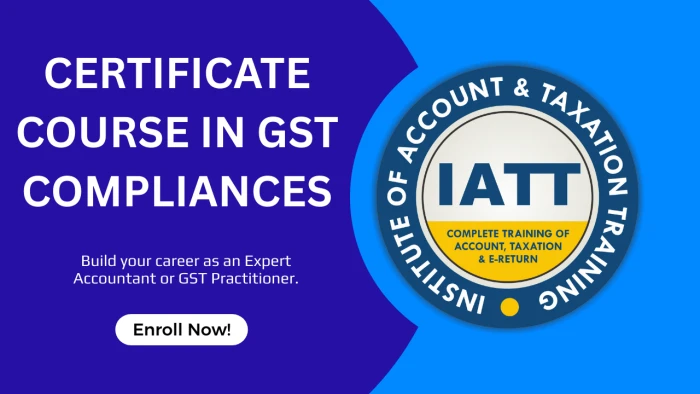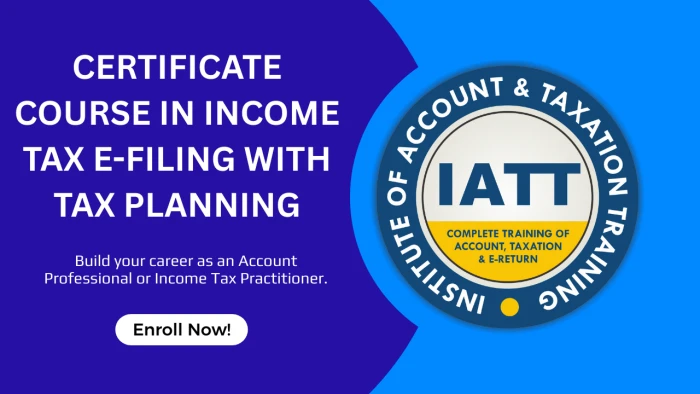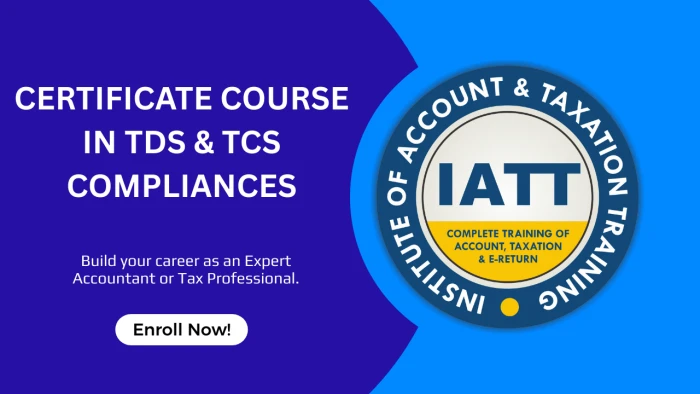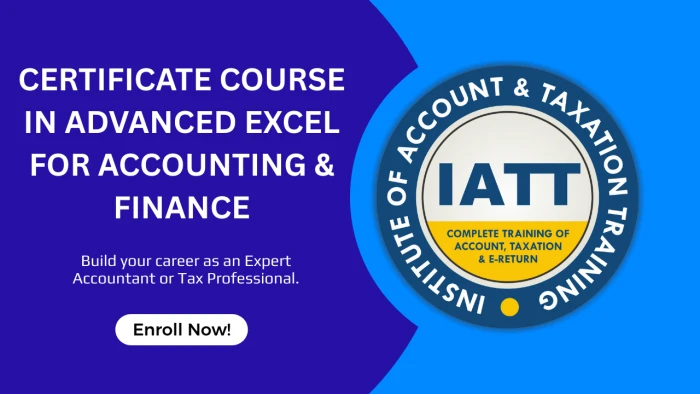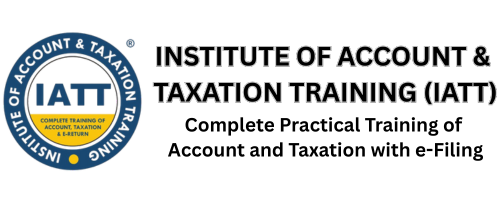

Certificate Course in Finalisation of Account (Non-Corporate Entity)
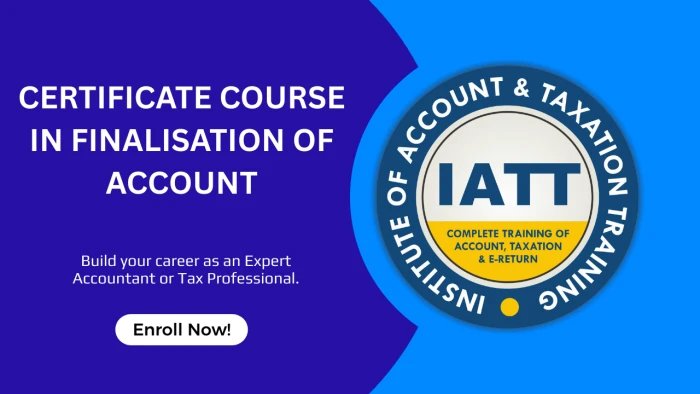
Certificate Course in Finalisation of Account (Non-Corporate Entity)
Course Description
Course Overview
This 100% practical course is designed to transform learners into independent, confident, and job-ready professionals capable of finalizing books of accounts for Non-Corporate Entities (NCEs) such as sole proprietorships, partnerships, and Limited Liability Partnerships (LLPs), akin to a Senior Accountant. The course integrates Income Tax, GST, and statutory compliance, offering hands-on experience with live working files, Excel templates, and a case-based finalization project.
Course Description
Mode of Delivery: Classroom / Live OnlineSession Duration: 1 Hour (Monday to Friday)
Morning Batch Timing: 8:00 AM to 9:00 AM
Upcoming Batch Start Date: Monday, August 04, 2025
Total Sessions: 10
Total Hours: 10
Course Objectives
By the end of the course, learners will:
- Finalize accounts independently without supervision.
- Apply GST, Income Tax, and statutory compliance practically.
- Prepare audit-ready financial statements and documentation.
- Use Excel tools and reconciliation formats like working professionals.
- Communicate effectively with management, tax consultants, and auditors.
- Avoid common finalization errors made by junior accountants.
- Make confident decisions using accounting judgment.
Eligibility Criteria
Required:
- Basic Accounting Knowledge (Journal entries, ledger posting, trial balance).
- Data Entry Skills (Excel, Tally, or any accounting software).
Ideal for:
- Accounting students, interns, trainees.
- Working accountants looking to upgrade.
- Tax practitioners and GST return preparers.
- Small business owners managing accounts in-house.
Target Audience
- Accounting students and interns
- Working accountants seeking career advancement
- Tax professionals and GST consultants
- Small business owners and entrepreneurs
- Freelance bookkeepers and financial consultants
Session-wise Syllabus Outline
Session 1: Introduction to Finalisation
- What is Finalisation? Why, When & How?
- Types of NCEs
- Roles: Accountant vs Auditor
- Computerized Accounting Cycle: Overview using Tally ERP 9
Session 2: Legal & Reporting Framework
- Mandatory Bookkeeping under Laws:
- Income Tax Act: Section 44AA, Presumptive Taxation (44AD, 44ADA, 44AE)
- GST Act: Record-keeping and compliance requirements
- Financial Reporting: ICAI Guidance Note (2022) for NCEs
- Key Accounting Standards (AS) for NCEs and MSME Exemptions
Session 3: Pre-Finalisation Checks – Part 1
- Overview of common accounting errors and their impact
- Opening Balances: Validation and error correction
- Sales Invoices and related Credit/Debit Notes matching with e-Way Bill, e-Invoice, Shipping Bill, GSTR-1, GSTR-1A, GSTR-3B
- Purchase Invoices: Verify Goods, Expenses, Assets; match with GSTR-2A/2B, GSTR-3B
- Bank Reconciliation Statement (BRS): Periodic and year-end
- Cash Transactions: Compliance with Income Tax limits
- Rectification/Closure of Suspense Accounts
- Confirmation of Account Receivable and Accounts Payable
- Analytical Ledger Review
- TDS Payment & Deduction Review
Session 4: Pre-Finalisation Checks – Part 2
- 26AS vs AIS vs TIS Review and Matching with books
- GST Ledger Reconciliation: Electronic Credit Ledger, Electronic Cash Ledger with Books
- MSME Compliances: Payment terms, disclosures, and Form MSME-1
- Statutory Compliance Check: PF, ESI, Shops & Establishment Act, Labor Laws
- Verify Statutory Outstanding Payments
Session 5: Year-End Adjustments – Part 1
- Accruals & Prepayments: Expense calculations and journal entries
- Advance Receipts: Accounting treatment and adjustments
- Accrued/Unearned Income: Calculations and journal entries
- Receivable Income Provisions
- Interest Payable/Receivable
- Journal Entries with calculation logic
Session 6: Year-End Adjustments – Part 2
- Depreciation: As per Income Tax Act and Accounting Standards
- Provisions and Bad Debts: As per Accounting Standards
- Inventory / Closing Stock Valuation: As per AS-2 (Cost or NRV) & Income Tax
- Sole Proprietorship: Net Profit Transfer to Capital Account
- Partnership Firm: Interest on Capital/Drawings, Partner Remuneration (Sec 40(b) compliance), TDS on Partner Payments, Profit Sharing
- Other NCEs (e.g., LLPs): Profit treatment
- Advance Tax: Calculation and Payment
Session 7: Final Financial Statement Preparation
- Financial Statement Formats: ICAI Guidelines (2022)
- Preparation of:
- Profit & Loss Account
- Balance Sheet
- Notes to Accounts
- Fund Flow and Cash Flow Statements: Preparation and analysis
Session 8: Audit Readiness & Review
- Audit-ready Finalisation Checklist
- Documentation & Backup Files
- Common Audit Queries & Practical Tips
- Top Mistakes Made by Junior Accountants
- Best Practices: Workpapers, Notes, Emails
Session 9: Advanced Case Studies
- Real-life practical case file
- Complete walk-through of finalisation steps
- Hands-on Excel working and documentation
- Excel Working File
Session 10: Final Evaluation & Career Guidance
- Optional MCQ + Finalisation Task
- Q&A Session: Address learner doubts and challenges
- Career Tips:
- How to talk like a senior accountant
- Job interview finalisation questions
- How to explain journal entries to clients
- Student Feedback & Closing
Certificate Course in Finalisation of Account (Non-Corporate Entity)
Course Description: A 100% practical course to finalize accounts for Non-Corporate Entities...
Price: ₹1800.00
Availability: In Stock
Start Date: August 04, 2025
Enroll NowCourse Syllabus
Objective Assessment
Duration: 10 Session (2 Weeks)
Get Admission +

